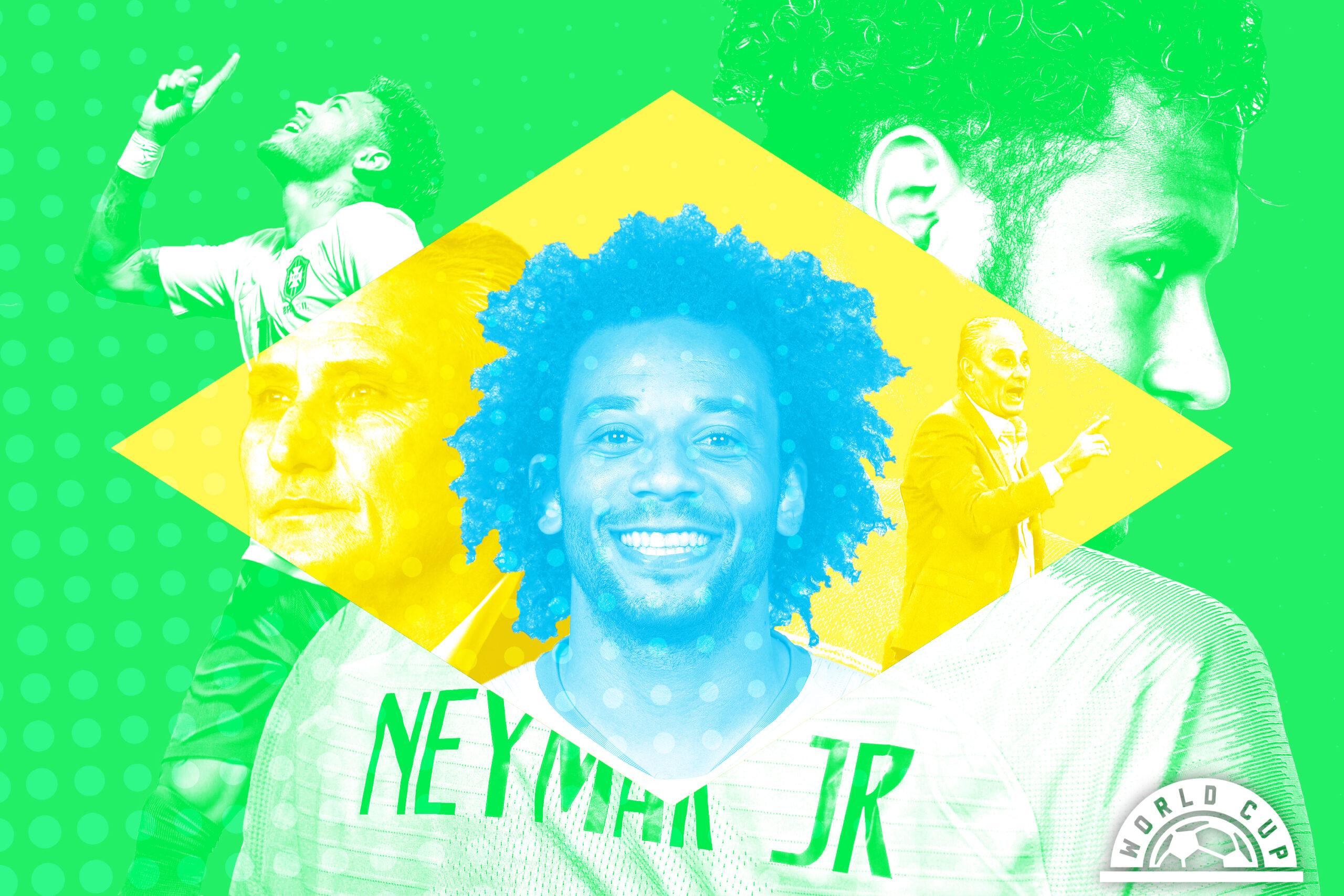
Predicting the World Cup is an inherently dumb thing to do. It’s seven games long, and, uh, the Orlando Magic and Memphis Grizzlies were leading the Eastern and Western conferences after seven games this past NBA season. But if there is one team that looks prepared to plow headfirst through the randomness in Russia this summer, it’s Brazil.
They’re among the betting favorites, but the Selecao still haven’t quite emerged as the favorite. “As good as Brazil are, they’re still arguably underrated,” said Omar Chaudhuri, head of footballing intelligence at the consultancy 21st Club. There’s a chance we’ll get to July 15 and wonder, as we watch Neymar lift the World Cup trophy, how we didn’t see it all along. So, to prevent that from happening—and to risk some relatively minor, low-stakes, online embarrassment—here are nine reasons why Brazil is gonna win it all.
1. The 7-1 loss to Germany happened four years ago.
The only real reason to be gun-shy about picking Brazil is because of what happened at the 2014 World Cup … which, as you can see above, was four years ago!
Neymar didn’t play in that game, neither did Thiago Silva, and of the players who did, just two starters and two substitutes remain. Even if you’re worried about their lingering self-doubt infecting the rest of the squad, take a look at what that quartet has done in the years since: Fernandinho was the starting defensive midfielder for the best team in Premier League history, Marcelo has won three Champions League titles, Willian has two Premier League trophies, and Paulinho just won La Liga by 14 points. And if that’s not enough: They’ve even upgraded on their Fred!
2. They finally have a coach who knows what he’s doing.
In 2014, Luiz Felipe Scolari selected a team that seemingly was built out of a fear of losing. Then, the Brazilian federation replaced him with Dunga, who they’d already fired once because his tactics were too conservative. Two years after hiring him again, they fired him again because his tactics were too conservative. Then, in stepped Tite, and Brazil have been the best team in the world ever since.
They finished 10 points clear of second place in South American qualifying, and their only loss under Tite came against Argentina in a friendly. The 57-year-old has found a way to do what his predecessors could not: build a sturdy defense without deflating what should be a world-class attack.
3. About that defense: It’s the best.
Since Tite took over, Brazil has conceded an almost impossible-to-comprehend 0.24 goals per game -- or: less than one goal every four games. Unsurprisingly, per FiveThirtyEight’s Soccer Power Index, they come into the tournament with the best defense by a good margin. That kind of solidity has become especially important in modern knockout play.
Soccer is a crapshoot. The best team, which 21st Club defines as “the team that creates notably more dangerous chances,” still only wins about 64 percent of the time. But at least in this century, defending has always been the way to push the odds further in your favor: “Take the winners of the last four World Cups and the last four European championships, from World Cup 2002 to Euro 2016, and the victorious winning side has played a total of 29 knockout games en route to victory,” Michael Cox wrote for ESPN. “Extraordinarily, those sides kept clean sheets on 24 occasions. On the other five occasions, they conceded only a single goal. Five concessions in 29 games.”
4. And even their potential weaknesses have cover.
Brazil’s projected starting center back pairing is the one part of the team that would’ve looked much better four years ago. Thiago Silva turns 34 in September and just isn’t the domineering free safety he used to be for Paris Saint-Germain; after intercepting 3.2 passes per 90 minutes in 2015-16, that number dropped to two in ’16-’17, and just 0.8 this past year. Meanwhile, Miranda is the same age as Silva, and he was sold by Atlético Madrid to Inter Milan in 2015 after a few years anchoring the best defense in Europe.
That’s still a competent duo, but not a dominant one. So, how to explain the five goals in 21 games? The guys in front and behind. With Manchester City’s Fernandinho and Real Madrid’s Casemiro playing together, two of the best defensive midfielders in the world shield their aging center backs. And on the off chance the opposition actually finds the space to get a shot off, all they have to do is beat one of the best keepers in the world. Roma overperformed their expected goals allowed more than any defense in Serie A—meaning: They conceded over 10 goals fewer than you’d expect, based on the quality of the shots they allowed—and Alisson was the reason why:
5. Their players play for the best teams in the world.
We often overcomplicate international soccer. The reality is: We barely get to see these teams play together, and most nations get to play in an international tournament only once every couple years. Attempting nuanced tactical analysis can be like looking for famous faces in the clouds. Sometimes, simplicity serves a more useful purpose.
“Having more players at better clubs is always a good indicator of how good a squad really is,” Chaudhuri said. “There’s a lot of emphasis on ‘form’ going into a tournament, but I’d personally rather take someone who is playing OK and is at a high-quality team than someone who is in-form at a lower-quality team.”
Among Brazil’s 23-man squad, 19 guys play for teams that will be in the Champions League next season, and 15 belong to sides currently in the top 10 of FiveThirtyEight’s global club rankings.
6. Marcelo might be one of a kind.
This guy, technically, is a defender:
The role of the modern fullback—as Mike L. Goodman put it earlier this week: “demanding one man both play as a winger in attack and not leave space behind himself defensively”—requires a near-super-human set of skills that only a handful of people on the planet possess. One of them, probably the best of them, is Marcelo. His range allows Brazil to avoid playing a third center back, and his incredible passing ability allows them to play to center midfielders who excel at things other than moving the ball forward. Think of Marcelo as Brazil’s skeleton key—with incredible hair.
7. Neymar is better than he’s ever been.
He missed around half of the Ligue 1 season, but when he played, Neymar was arguably the most dangerous attacking player in the world. When you add up non-penalty expected goals and expected assists per 90 minutes, here are the top five across all of Europe:
Expected Goals and Expected Assists Per 90 Minutes
Now, the bottom of the French league is essentially a succession of punching bags that would inflate anyone on PSG’s numbers, but before he hurt his foot in February, Neymar had a seat at the Messi-Ronaldo table. And well, it looks like he’s ready to knock on that door once again:
8. They might not even need him, either!
Of course, an overreliance on Neymar—in addition to Juan Zuniga’s knee—seemed to be what doomed Brazil four years ago. Knowing what happened afterward, if you go back and watch the national anthem before the Germany game, it almost looks like they were mourning the dude’s death:
This time around, though, Brazil could probably still win it all without him. In qualifying, Manchester City’s Gabriel Jesus led the team with seven goals. Paulinho and Neymar each scored six, while Barcelona’s Philippe Coutinho and Willian each scored four. In addition to those attacking threats, there’s also Liverpool’s Roberto Firmino, who had 15 goals and seven assists in the Premier League this past season, and Douglas Costa, who had four goals and 12 assists for Juventus in Serie A. Even if Neymar goes down or gets shut down, between those six other players, Brazil has 58 goals and 48 assists’ worth of production in Europe’s top leagues backing him up.
9. They are, after all, Brazil.
When it comes to the World Cup, history tends to matter more than it does in maybe any other sporting event. While I still struggle to wrap my head around it, all 20 World Cups have been won by a total of only eight countries. And if you consider the English Channel to be a border, every World Cup winner shares a border with at least one other World Cup winner. Along with income per capita and population size, as Simon Kuper and Stefan Szymanski outline in Soccernomics, the number of international games a country has played is the biggest indicator of who will win a given game.
“Who do we think of as the number one, greatest soccer nation in the history of the world?” Szymanski asked me. “Some might say Germany but most of us still think it’s that unbelievably disorganized and chaotic nation: Brazil.”
They’re the only country to qualify for every World Cup, and they’re the only nation to win more than four. Not only does Brazil have what looks like the most balanced and deepest squad in the tournament, they also have the momentum of history pushing them along. Oh, and I almost forgot: The statistical models love their chances, too.
